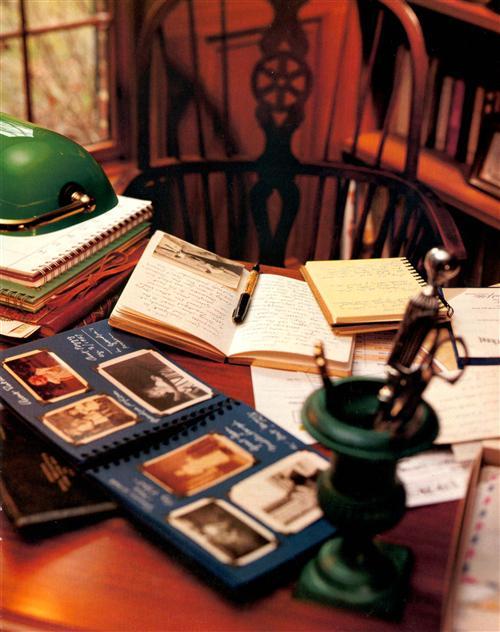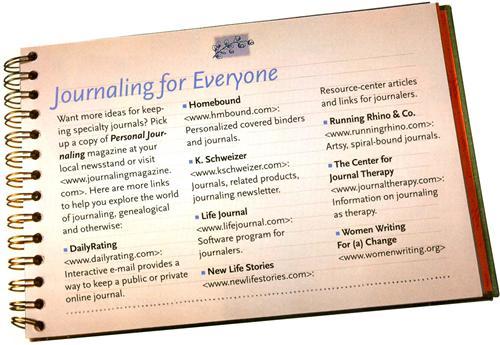Sign up for the Family Tree Newsletter Plus, you’ll receive our 10 Essential Genealogy Research Forms PDF as a special thank you!
Get Your Free Genealogy Forms
"*" indicates required fields
When I became interested in climbing my family tree, nobody told me that this obsession would infiltrate every aspect of my life — right down to making bizarre notations in my diary:
22 September 1998, at home: Woke up about an hour after I went to bed and realized I had never checked to see if Nancy Banc had an obituary.
17 January 1999, at home: Didn’t think I would sleep at all last night thinking about Eliza Munson. I’m so exited about the coroner’s report that arrived in today’s mail…
When my teenage daughter said to me in shock, “That’s what you write about in your diary?” I realized it was time to start a separate journal to record my family history search. I also thought what a unique journal this would make for my descendants: Unlike my personal diary, which is no more fascinating to a teenager now that it’s reduced to recording tasks like laundry and house-cleaning, this journal would be filled with scandalous deeds long forgotten. Best of all, I wouldn’t get blamed for any of them! Finally, I could keep a true-life journal that would be just as riveting as an episode of “Temptation Island.”
A family history research journal is different from keeping an account of your life and activities for your descendants. While journaling your life story is extremely important, what I’m talking about here is a specialty journal that records your genealogical research discoveries. A family history research journal is also different from what genealogists typically think of as a “research log” or “research calendar.” In a log or calendar, you primarily record the facts of your research — the date of your search, a source citation for the records you’ve looked at, the results of the search — in columnar format or in a database. These logs serve a functional purpose in research, and I’m not suggesting substituting a specialty journal for them, either. But just as pure facts on a pedigree chart are sterile and unappealing to share with others — “Oh, so Grandpa Joe was born in 1906. How ’bout that.” — sharing your data on a research log no doubt ranks a close tie with being in a coma. Research logs are worksheets, just like pedigree charts, and not something you’d expect to thrill and delight your family with around a cozy fireplace as you nibble from a big bowl of buttered popcorn.
In a special family history research journal, however, you show your joys, frustrations and feelings about your search for your ancestors. You might even include impressions you have about a particular ancestor from your research, such as: “I’m not sure I like Great-grandpa Andrew. I found a divorce record today in the county next to the one he and Great-grandma lived in, accusing him of beating his first wife. Wonder what Great-grandma saw in him. She must not have known about his past in the next county when she married him.” Or: “Wow. I didn’t know my third great-grandmother went to law school and had to hide being married so she wouldn’t get thrown out. She must’ve been quite some woman!”
Getting down the inside story
For example, I used my family history research journal to record the saga — for that’s what it was to me — of sleuthing out the truth about my grandmother’s birth. My mother had always insisted that her mother, Rose (Norris) (O’Connor) Fitzhugh, was born in Ireland. But I knew that couldn’t be. I had a copy of Rose’s birth certificate, which clearly stated she was born in Greenwich, Conn. In fact, Grandma was the youngest of seven children, all born in Greenwich. It was Rose’s mother, Delia, who was born in Ireland. But my mother refused to believe me despite my proof. She claimed she’d heard the story many times when she was a child that her mother, Rose, was born in Ireland and had scarlet fever on the ship’s journey to America.
When my mother’s older sister came for a holiday visit, I decided I needed to get her version of this conflicting story. I recorded the outcome in my family history journal:
22 December 1997, at home: Interviewed Aunt Kathryn (my mother’s older sister) while she was here visiting for the holidays. She cleared up the story my mother had told me about Grandma Rose being born in Ireland and getting scarlet fever on the ship over. As it turns out, Grandma Rose was born in Connecticut (as I had discovered from my research), but the family went back to Ireland after she was born. I can’t wait to go on my trip to the Family History Library next week to check out the story.
3 January 1998, Salt Lake City, Family History Library: Found it right off the bat. Located Delia and David Norris, my great-grandparents, and their children, including Rose, on a passenger arrival list for the ship Oceanic; showing the family returning to America from Ireland and sailing from Queenstown on 31 October 1901 — the day after Rose’s fifth birthday. This must be why the story got distorted in my mothers version. Then I checked the 1901 census for Ireland, but I couldn’t find them listed. At least now I have a likely town of origin in Ireland for my great-grandfather David, which I didn’t have before. The passenger list says they were in Cookstomi in County Tyrone, and according to David’s death certificate, he was born in County Tyrone.
A journal like this gives so much more meaning to your family history search. We often lament not being privy to our ancestors’ thoughts and feelings. Now you have an opportunity to let your descendants in on your thoughts about this hobby of collecting dead relatives that gives you so much pleasure. It also makes keeping a journal a lot more fun. And you don’t have to be a wonderful writer: Mistakes don’t matter. You’re keeping it for yourself and for your descendants on a special topic.
You can keep this kind of journal as a handwritten account in a spiral notebook, in one of those special blank journaling books you can purchase in bookstores and gift shops, or on your computer. I keep mine as a computer file, then print out the pages and put them in a special notebook. Since I take my laptop computer with me on research outings, it’s easy to open the journal file and record my discoveries and roadblocks as I’m researching. It also helps me think about what I’m looking for and what my next steps will be.
Five perks of journaling
Still not convinced? Here are five ways you’ll benefit from keeping a family history research journal:
- Analyzing and organizing: Your journal enables you to sort out what you’ve uncovered, helping you ponder and analyze your findings and formulate a plan for the next step in your search. Anyone who’s ever attempted to write a family history knows that as soon as you get home from a research trip and begin putting your research on paper in an organized manner so that others can follow along, you suddenly discover holes in your research. It’s called the Gee-Why-Didn’t-I-Notice-That-Before Law of Genealogy. Journaling helps reveal those holes much sooner, while you’re still in the heat of research and able to do something about it. When you finally do write your family history, your journal will be invaluable, since you’ll have recorded all your discoveries as they happened. You’ll be able to re-create your steps quickly and easily. Your journal will also prod your memory about minor details you might have otherwise forgotten.
- Reviewing and planning: If you’re like most genealogists, you don’t get to research every day or as frequently as you would like. Life, work and those people you live with who insist upon being fed daily get in the way. When you are able to get back to research, you’d be likely to review your notes and logs, scratch your head and say to yourself, “Did I really think Uncle Sid was in California by then? Why did I think that?” Wonder no more — your journal will have your answer. Unlike a research log, your journal has room for you to record why you think certain things and look at particular records. It will refresh your memory on what you’d been working on when you set it aside, and what leads you were planning to follow next. During your off-research time, you can make notes in your journal as ideas come to you for your next research trip. Now you never have to worry about losing your to-do list.
- Recording and researching family stories: Through your journal, you’ll also be recording those family stories you’ve heard a million times from Uncle Harry. You know, the ones you know you really should be recording somewhere, but you haven’t figured out exactly where since there’s no room on your charts and forms and the stories haven’t been verified vet. Now you have a place, and you can add your own thoughts about the stories, like my journal entries about my mother’s story of her mother being born in Ireland. When I followed it up with an interview with my aunt and my research, the pieces all came together. Recording the family lore also reminds you of those stories you want to later corroborate with actual research.
- Sharing your search: Journaling is a good way to share your excitement over those discoveries that non-genealogists just don’t understand and can’t fully appreciate. Have you ever tried to share with family and friends your elation over a death certificate that just arrived in the mail? Non-family history sleuths don’t treasure these special, happy moments in a genealogist’s life. If you’ve got a family history Web site, why not post your family history research journal on it? Then others researching the same family lines can see where you are in the search and what leads you’re following.
- Telling the whole story: By keeping a journal, you’re telling the whole story of your search for your family history as it happens. The documents you gather, the names you add to the charts and those sterile research logs tell the only facts. Your journal records the full experience of stalking your ancestors:
8 January 1998, Salt Lake City, Family History Library: Had a good research day. Made a breakthrough on William Gibbons Stuart of Virginia. Everything I’ve ever seen published by other researchers “no further record” on him beyond the 1830s. In 1858, however, I found his wife selling property in Virginia, and she stated she was “of Manchester, Missouri.” That’s why other researchers haw lost him. Checked the 1860 census for Missouri, and sure enough, William, his wife, and about Six kids moved from Virginia to St. Lows County. Of course, hurdling this brick wall now opens up tons of research prospects
Then, on the very next day:
9 January 1998, Salt Lake City, Family History Library: I can’t believe it. I’ve already lost the Stuarts in Missouri…
Your journal needs to show these frustrations, too. Venting always helps, and doing so in a journal is better than taking it out on some poor library volunteer.
Your family history search might not always be easy, but it is always interesting. And my mother might have been wrong about her mother’s place of birth, but she was right about one thing: Grandma Rose was on a ship that left Ireland. I’ve yet to prove whether or not Rose had scarlet fever during the journey. Even though I have a copy of the passenger ship list in my genealogy files, it’s only through my family history research journal that my descendants will know the whole story surrounding my search for that document.
Who knows? Someday maybe even my teenage daughter will find that journal as fascinating as a kiss-and-tell diary.
Tips for Starting Your Family History Research Journal
• You can use a blank journal, a notebook or a computer-generated journal, whatever works best for you.
• Your journal might not be a daily account, since most people don’t research on a daily basis. But as thoughts about your research come to you, be sure to make an entry.
• Consider having more than one journal; you might start a journal for each family line you’re researching.
• Ideally, your entries should be thorough, so that your journal can stand alone and replace any research logs should they get lost or misplaced. Things you might want to include are:
- the date of your search
- the research repository where your search was conducted; or if you received a document through the mall; or if it was an Internet search
- the name of the ancestor you’re searching for
- the types of records or resources you checked
- the condition of the records (water-stained, faded ink, torn pages, binding too tight to read notations in margins, etc.), and how this affected your research
- what you had hoped to find (“I was looking for Grandpa James’ birth record…”)
- what you found (“…instead of finding Grandpa James’ birth record, I found a marriage record for Grandpa James to some woman before he married Grandma!”)
- family stories
- any new clues or leads
- how you felt about your find or lack of find
ADVERTISEMENT






